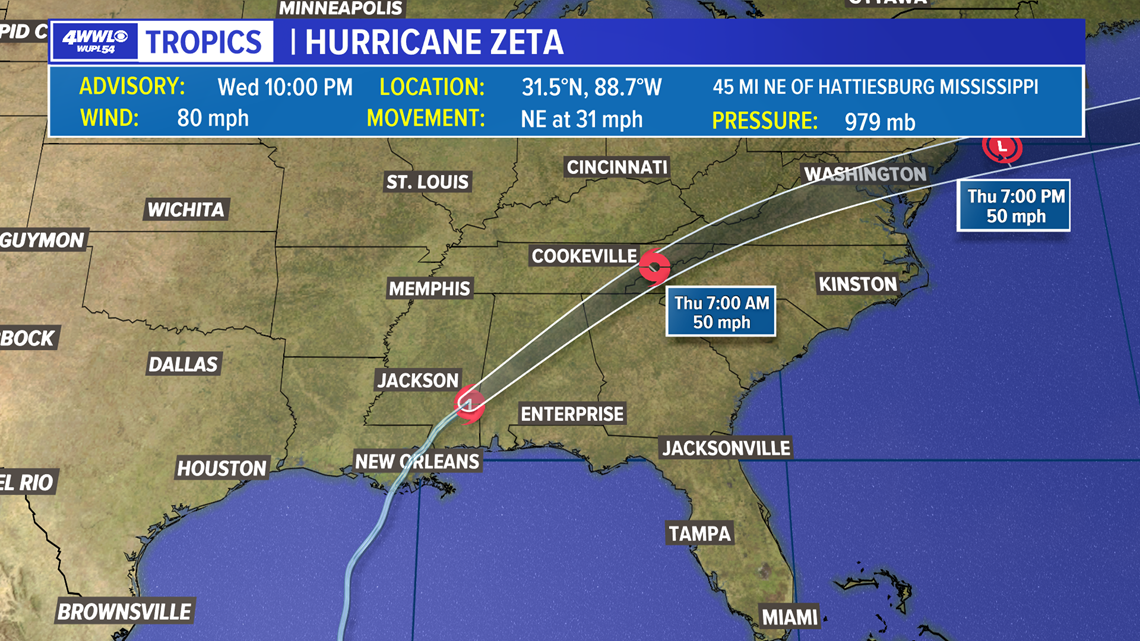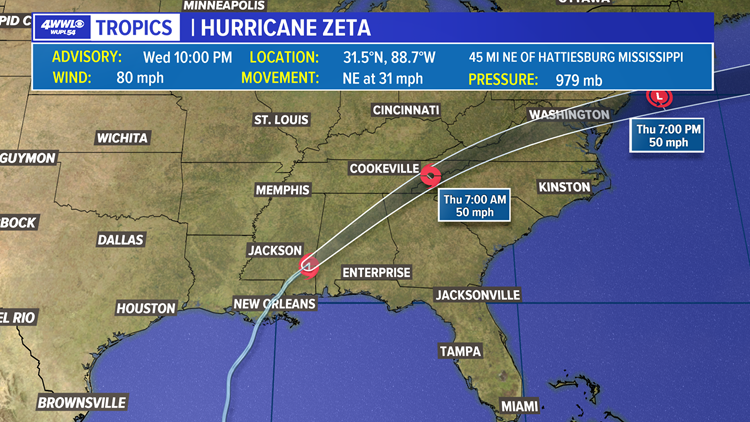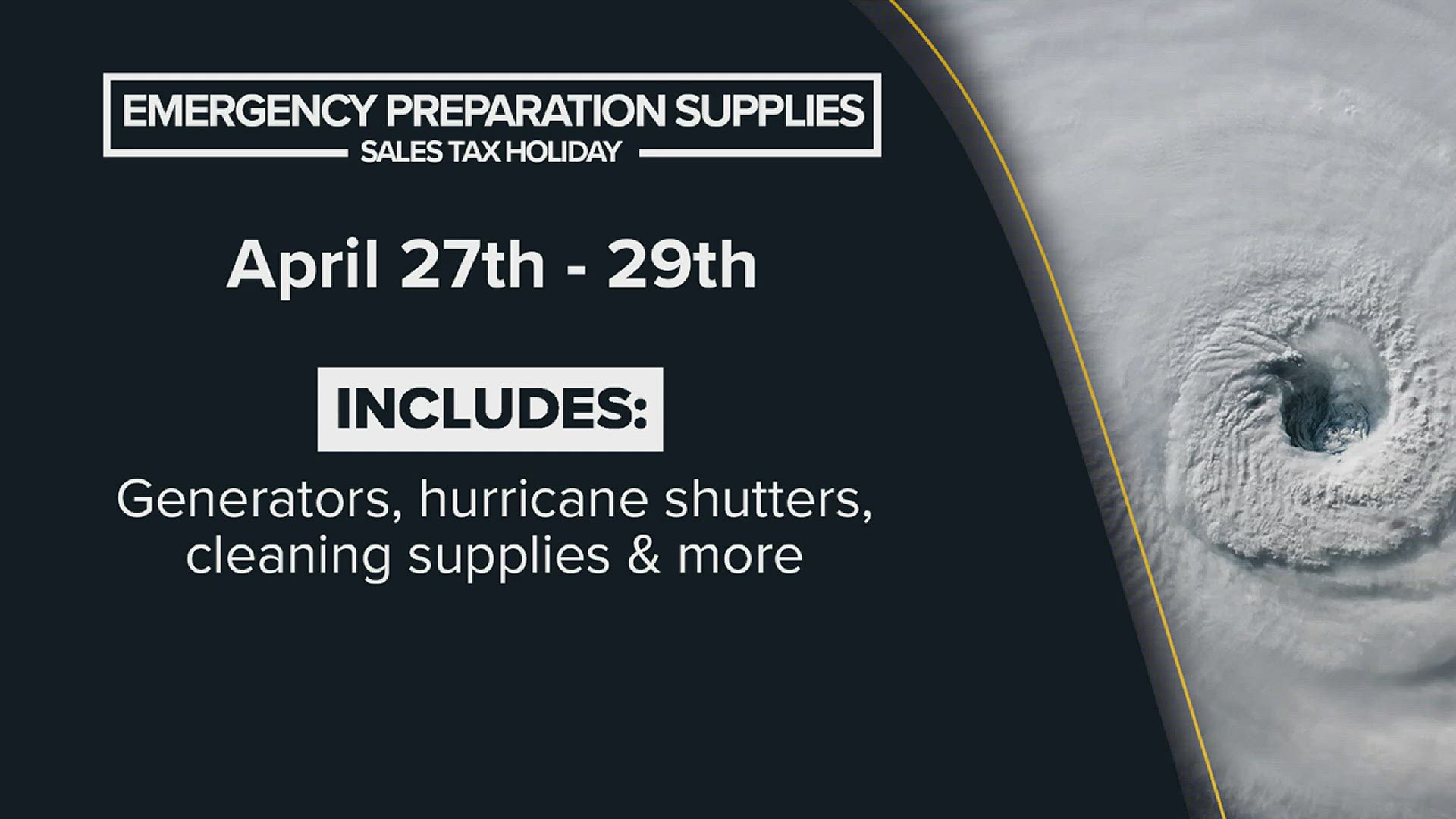BEAUMONT, Texas — As of 10 p.m. Wednesday, Hurricane Zeta, now a category one storm, is moving quickly through Mississippi and Alabama with storm surge and strong winds.
Zeta is about 45 miles northeast of Hattiesburg, Mississippi, with maximum winds of 80 mph. It's moving northeast at 31 mph as of the 10 p.m. update from the NHC. Its speed has continued to increase in the past few hours.
Hurricane and storm surge warnings have been discontinued for all of Louisiana, including Lake Borgne and Lake Pontchartrain.
A northward to north-northeastward motion is expected through tonight. The National Hurricane Center reported the storm started making landfall around 4 p.m. Wednesday near Cocodrie, Louisiana.
Zeta is expected to move across the southeastern and eastern United States on Thursday.
Zeta ties 2020 with 2005 for the most named storms on record in the Atlantic, which stands at 27.


Latest forecast from the National Hurricane Center...
At 1000 PM CDT (0300 UTC), the center of Hurricane Zeta was located near latitude 31.5 North, longitude 88.7 West. Zeta is moving toward the northeast near 31 mph (50 km/h). An even faster northeastward motion is expected overnight through Thursday, then a rapid east-northeastward motion is anticipated through Friday. On the forecast track, the center of Zeta will move into southern Alabama soon and then move quickly across the southeastern eastern United States through Thursday before emerging offshore of Mid-Atlantic coast late Thursday.
Maximum sustained winds have decreased to near 80 mph (130 km/h) with higher gusts. Further weakening is expected, and Zeta should decay into a tropical storm overnight and into a non-tropical gale-force low Thursday morning. The low should become absorbed by a frontal system over the western Atlantic on Friday.
Hurricane-force winds extend outward up to 25 miles (35 km) from the center and tropical-storm-force winds extend outward up to 150 miles (240 km). Mobile Regional Airport recently reported sustained winds of 48 mph (78 km/h) and a wind gust of 91 mph (146 km/h).
The estimated minimum central pressure is 979 mb (28.91 inches)
Tracking the Tropics
Be prepared if a storm comes our way
BEFORE THE STORM
- Make a home inventory
- Have a current copy of your declarations page that has your policy number and your agent's number
- Review your policy with your insurance agent to determine if you have adequate coverage
- Repair loose boards, shingles, shutters and downspouts to prevent them from becoming an issue in high winds or torrential rain
- Have an evacuation plan, and include plans for your pets
- Make sure your emergency equipment is in working order, including a battery-powered radio, flashlights and extra batteries. Also, make sure to gather all medicine, replenish your first-aid kit and stock a week's worth of non-perishable food and water
- Charge your cell phone and fill your car with gas
- Program all emergency phone numbers
DURING THE STORM
- If you are advised to evacuate, leave as soon as possible. Retain all related receipts - they may be considered in your claim. If you aren't in a recommended evacuation and you plant to stay home, stay informed by listening to weather alerts
- Keep windows and doors closed at all time, and, if possible, board them up with wooden or metal shutters
- Stay away from the windows and in the center of the room, or, stay in an interior room
- Avoid flood water, as it may be electrically charged from downed power lines
- Check on family members and friends\
AFTER THE STORM
- Check to be sure your family members are safe
- If you did evacuate, wait for official notice that it is safe to re-enter your neighborhood and your house
- Document damaged property, and take photos and videos. Don't dispose of any damaged items without approval
- Keep a record of any temporary repairs or expenses to prevent further damage to your property.


